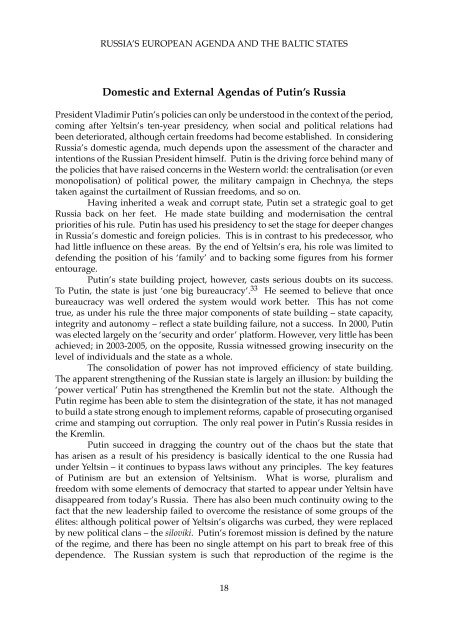Russia's European Agenda and The Baltic States - Defence ...
Russia's European Agenda and The Baltic States - Defence ...
Russia's European Agenda and The Baltic States - Defence ...
Create successful ePaper yourself
Turn your PDF publications into a flip-book with our unique Google optimized e-Paper software.
RUSSIA’S EUROPEAN AGENDA AND THE BALTIC STATES<br />
Domestic <strong>and</strong> External <strong>Agenda</strong>s of Putin’s Russia<br />
President Vladimir Putin’s policies can only be understood in the context of the period,<br />
coming after Yeltsin’s ten-year presidency, when social <strong>and</strong> political relations had<br />
been deteriorated, although certain freedoms had become established. In considering<br />
Russia’s domestic agenda, much depends upon the assessment of the character <strong>and</strong><br />
intentions of the Russian President himself. Putin is the driving force behind many of<br />
the policies that have raised concerns in the Western world: the centralisation (or even<br />
monopolisation) of political power, the military campaign in Chechnya, the steps<br />
taken against the curtailment of Russian freedoms, <strong>and</strong> so on.<br />
Having inherited a weak <strong>and</strong> corrupt state, Putin set a strategic goal to get<br />
Russia back on her feet. He made state building <strong>and</strong> modernisation the central<br />
priorities of his rule. Putin has used his presidency to set the stage for deeper changes<br />
in Russia’s domestic <strong>and</strong> foreign policies. This is in contrast to his predecessor, who<br />
had little influence on these areas. By the end of Yeltsin’s era, his role was limited to<br />
defending the position of his ‘family’ <strong>and</strong> to backing some figures from his former<br />
entourage.<br />
Putin’s state building project, however, casts serious doubts on its success.<br />
To Putin, the state is just ‘one big bureaucracy’. 33 He seemed to believe that once<br />
bureaucracy was well ordered the system would work better. This has not come<br />
true, as under his rule the three major components of state building – state capacity,<br />
integrity <strong>and</strong> autonomy – reflect a state building failure, not a success. In 2000, Putin<br />
was elected largely on the ‘security <strong>and</strong> order’ platform. However, very little has been<br />
achieved; in 2003-2005, on the opposite, Russia witnessed growing insecurity on the<br />
level of individuals <strong>and</strong> the state as a whole.<br />
<strong>The</strong> consolidation of power has not improved efficiency of state building.<br />
<strong>The</strong> apparent strengthening of the Russian state is largely an illusion: by building the<br />
‘power vertical’ Putin has strengthened the Kremlin but not the state. Although the<br />
Putin regime has been able to stem the disintegration of the state, it has not managed<br />
to build a state strong enough to implement reforms, capable of prosecuting organised<br />
crime <strong>and</strong> stamping out corruption. <strong>The</strong> only real power in Putin’s Russia resides in<br />
the Kremlin.<br />
Putin succeed in dragging the country out of the chaos but the state that<br />
has arisen as a result of his presidency is basically identical to the one Russia had<br />
under Yeltsin – it continues to bypass laws without any principles. <strong>The</strong> key features<br />
of Putinism are but an extension of Yeltsinism. What is worse, pluralism <strong>and</strong><br />
freedom with some elements of democracy that started to appear under Yeltsin have<br />
disappeared from today’s Russia. <strong>The</strong>re has also been much continuity owing to the<br />
fact that the new leadership failed to overcome the resistance of some groups of the<br />
élites: although political power of Yeltsin’s oligarchs was curbed, they were replaced<br />
by new political clans – the siloviki. Putin’s foremost mission is defined by the nature<br />
of the regime, <strong>and</strong> there has been no single attempt on his part to break free of this<br />
dependence. <strong>The</strong> Russian system is such that reproduction of the regime is the<br />
18

















